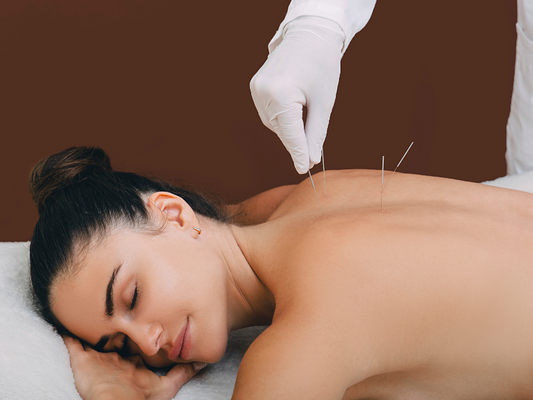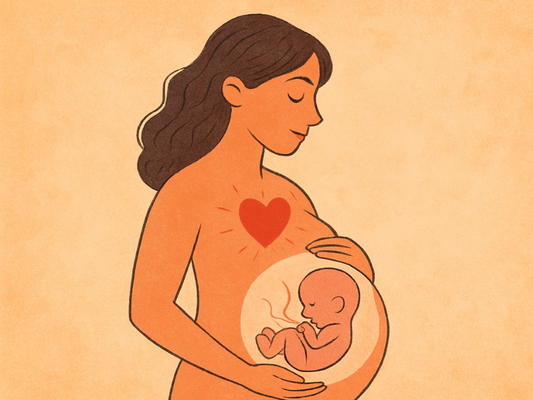
Boosting Fertility Naturally
Laying the Foundation for Fertility: Understanding the Bigger Picture
Did you know that sperm can live inside the female body for up to five days, and that eggs are affected by lifestyle choices months before ovulation?
Fertility isn’t just about timing—it’s about optimizing the health of both sperm and eggs. The journey to conception is a delicate interplay of nutrition, lifestyle, and hormonal balance. Many couples trying to conceive often focus solely on ovulation cycles, but understanding how diet and daily habits influence reproductive health is just as crucial.
Like many healthcare professionals, we understand the challenges of fertility and the emotional weight that comes with it. That’s why we are committed to providing holistic, research-backed guidance to support your reproductive journey. In this guide, we’ll explore surprising facts about sperm and egg health, essential nutrients for fertility, and simple lifestyle shifts that can naturally enhance conception.
Sperm & Egg Health: Understanding Their Role in Conception
Sperm and egg health are fundamental to conception. Sperm quality is measured by motility (movement), morphology (shape), and count, while eggs must be nourished months before ovulation for optimal health. External factors such as diet, toxins, and stress can greatly impact reproductive success.
A study published in the journal Human Reproduction found that women adhering to a Mediterranean-style diet—rich in healthy fats, vegetables, and lean proteins—experienced improved egg quality. (Source: Oxford Academic Human Reproduction)
Similarly, research indicates that men who consume key nutrients such as zinc and CoQ10 show significant improvements in sperm parameters. (Source: Oxford Academic Human Reproduction Update)
Tips to Support Sperm & Egg Health:
Eat antioxidant-rich foods to combat oxidative stress.
Avoid exposure to environmental toxins like pesticides and plastics.
Consider WeNatal Together Prenatals for Men & Women for comprehensive sperm and egg support.
Maintain a balanced diet rich in folate, omega-3s, zinc, selenium, and vitamin D.
Stay hydrated with an optimal water filter to support cellular function and hormone production.
Exercise regularly to improve blood circulation to reproductive organs.
Reduce stress through meditation, walking, or deep-breathing exercises.
Get adequate sleep to regulate hormones and support overall reproductive health.
Limit caffeine and alcohol intake, as excessive consumption can negatively impact fertility.
Avoid smoking and exposure to secondhand smoke, which can damage sperm and egg quality.
The journey to conception starts with the foundation of sperm and egg health. By making conscious choices regarding diet, lifestyle, and toxin exposure, you set the stage for a more successful and healthy pregnancy.
Small daily actions—like choosing nutrient-rich foods and avoiding harmful chemicals (e.g., candles, perfumes, deodorants, and cleaning supplies containing forever chemicals)—can have a profound impact on reproductive success. Supporting egg and sperm health isn’t just about increasing the chances of conception but also about fostering long-term well-being for both parents and baby.
Key Nutrients: Essential Vitamins and Minerals for Fertility
Nutrition plays a vital role in reproductive health. Essential fertility-boosting nutrients include:
Folate: Supports healthy cell division and reduces the risk of neural tube defects. Found in leafy greens, legumes, and WeNatal Together prenatals.
Omega-3 Fatty Acids: Improve egg quality and regulate hormones. Best sources include salmon, walnuts, and flaxseeds.
Zinc & Selenium: Enhance sperm motility and protect against oxidative stress. Found in oysters, pumpkin seeds, and nuts.
Vitamin D: Supports hormone regulation and overall fertility. Found in fatty fish, eggs, and sunlight exposure.
CoQ10: Boosts mitochondrial function in eggs and sperm. Best sources include nuts, seeds, and organ meats.
Iron: Helps prevent ovulatory infertility. Found in spinach, lentils, and red meat.
Choline: Essential for fetal brain development and egg quality. Found in eggs and liver.
For those looking for a holistic approach to fertility nutrition, Awakening Fertility: The Essential Art of Preparing for Pregnancy is a must-read. This beautifully crafted book goes beyond basic nutritional advice, offering practical wisdom, nourishing recipes, and guidance on preparing your body for pregnancy. It blends ancient traditions with modern science, making it an invaluable resource for anyone looking to enhance their fertility naturally.
Why You’ll Love This Book:
1. A deep dive into fertility-enhancing foods and their benefits.
2. Science-backed insights into how nutrition affects egg and sperm health.
3. Over 50 nourishing recipes designed to support conception.
4. Gentle lifestyle recommendations to balance hormones and promote well-being.
5. A mindful, holistic approach to embracing the journey of parenthood.
“Awakening Fertility completely changed the way I approached my preconception journey. I always thought fertility was just about timing, but this book opened my eyes to the power of nutrition and mindfulness. The recipes are not only delicious but also incredibly nourishing. I felt more energized, balanced, and in tune with my body. After struggling for months, I finally got my positive pregnancy test! Thank you for this beautiful, life-changing resource.” — Emily, six-months pregnant
Fertility Foods: Best Choices to Support Reproductive Wellness
A well-balanced, fertility-supportive diet provides the essential nutrients needed to optimize reproductive function. Research highlights that diet plays a crucial role in hormonal balance, egg quality, sperm health, and overall fertility. A study published in Fertility and Sterility found that diets rich in whole foods, antioxidants, and essential fatty acids are linked to improved conception rates and a lower risk of infertility. (Source: Fertility and Sterility)
Best Foods for Fertility
Egg-Friendly Foods (Support egg quality and ovarian function)
Avocados – Rich in healthy fats and folate, essential for egg development
Berries – Packed with antioxidants that protect eggs from oxidative stress
Sunflower seeds – A great source of vitamin E, which improves ovarian health
Wild Salmon – High in omega-3s, known to support hormone production and egg maturation
Pasture-Raised & Organic Eggs – Provide choline, which enhances embryo development and implantation
Sperm-Boosting Foods (Enhance sperm quality, motility, and count)
Brazil nuts – High in selenium, crucial for sperm motility and DNA integrity
Pumpkin seeds – Contain zinc, which supports testosterone levels and sperm production
Green leafy vegetables – Provide folate, important for sperm health and reduced abnormalities
Dark chocolate – Contains L-arginine, which may improve sperm count and motility
Womb-Warming Foods (Support uterine health and circulation)
Ginger – Boosts blood flow to the uterus and has anti-inflammatory properties
Cinnamon – Helps regulate blood sugar and supports healthy ovulation
Bone broth – Provides collagen and minerals that nourish the uterine lining
Turmeric – Has anti-inflammatory benefits that promote a healthy reproductive environment
Red raspberry leaf tea – Traditionally used to strengthen the uterus and regulate cycles
Choosing the right fertility-friendly foods can positively impact reproductive health and create a supportive environment for conception. Nutrient-dense whole foods nourish the body at a cellular level, enhancing both egg and sperm function. Small dietary adjustments can yield significant long-term benefits for reproductive wellness.
Lifestyle Factors: How Stress, Sleep, and Exercise Affect Fertility
Lifestyle choices have a profound impact on reproductive health, influencing hormonal balance, ovulation, and overall fertility. Chronic stress can elevate cortisol levels, disrupting reproductive hormones and menstrual cycles. Poor sleep quality or insufficient rest may interfere with the body's ability to regulate hormones essential for conception.
Meanwhile, a sedentary lifestyle can contribute to weight imbalances and poor circulation, both of which can negatively affect fertility. By adopting healthy habits, individuals can support their reproductive well-being and improve their chances of conception.
Tips for a Fertility-Friendly Lifestyle:
Manage stress through walking (min hour daily), meditation, deep breathing exercises, or engaging in creative activities that promote relaxation.
Prioritize sleep by maintaining a consistent sleep schedule, reducing screen time before bed, and creating a calming nighttime routine.
Engage in moderate exercise such as stretching, swimming, or fertility-friendly yoga to support circulation, hormone balance, and a healthy weight.
Maintain a nutrient-rich diet by consuming whole foods, healthy fats, lean proteins, and fertility-boosting nutrients like folate, zinc, and omega-3s.
Stay hydrated by drinking enough water to support overall health, hormone regulation, and optimal cervical mucus production.
Limit caffeine and alcohol intake, as excessive consumption can interfere with hormonal balance and reduce fertility potential.
Support gut health with probiotics and fiber-rich foods to enhance nutrient absorption and reduce inflammation in the body.
Reduce exposure to environmental toxins by choosing organic produce when possible, avoiding plastic food containers, and using natural cleaning products.
A well-regulated lifestyle supports hormonal stability, enhances reproductive function, and increases overall well-being. Taking the time to relax, rest, and engage in mindful movement can make a meaningful difference in the conception journey. Making small yet consistent efforts to improve lifestyle habits will create a fertile environment that fosters long-term health.
Myths vs. Facts: Debunking Common Fertility Misconceptions
Fertility is often surrounded by misinformation, leading to unnecessary fear and stress. Many couples struggle to separate fact from fiction, which can make the journey to conception more challenging. By debunking common myths, we can empower individuals with accurate knowledge and confidence in their reproductive health.
Myth: Infertility is only a woman’s issue.
Fact: Male factor infertility contributes to 35-50% of conception challenges. The Male Fertility Bundle provides essential tools to improve sperm motility, count, and morphology.
Myth: You can’t get pregnant after 35.
Fact: While fertility declines with age, many women conceive naturally in their late 30s and early 40s with proper lifestyle, mindset, and nutritional support.
Myth: Taking birth control for years will cause infertility.
Fact: Birth control temporarily prevents ovulation with 99% effectiveness. Most Women resume regular cycles within a few months. We recommend a thorough detox after stopping contraception, supported by acupuncture, nutrient-rich foods, and other cleansing practices.
Myth: Certain sexual positions increase the chances of conception.
Fact: There is no scientific evidence that specific positions improve conception rates. However, lying down with your legs up against a wall for 1-20 minutes after intercourse may help sperm travel toward the egg.
Myth: Stress alone causes infertility.
Fact: While chronic stress can impact hormones and play a significant role in fertility, it is just one piece of the puzzle. Factors like physical health, emotional readiness, and even the soul of the child also influence conception. Managing stress through self-care, such as using womb warming fertility, can help support overall reproductive well-being.
Myth: If you’re healthy, you won’t have fertility issues.
Fact: Even those with active lifestyles and balanced diets can experience fertility challenges due to high stress levels, genetic factors, environmental exposures, underlying health conditions, or partnership challenges.
Comprehensive fertility support can help bridge nutrient gaps and enhance reproductive health.
Fertility can be easy or complex, but understanding the truth can help couples make informed decisions. By separating myths from facts, we can navigate the journey to conception with greater clarity and peace of mind.
Hormonal Balance: Natural Ways to Regulate Reproductive Health
Hormonal balance is a crucial factor in reproductive success. Estrogen, progesterone, and testosterone must be in harmony for optimal fertility. Disruptions can result from stress, poor diet, or endocrine disruptors.
Natural Methods for Hormonal Balance:
Reduce processed foods and avoid artificial additives that interfere with hormones.
Incorporate adaptogenic herbs such as maca, ashwagandha, and holy basil to support endocrine function.
Use Fertility Womb Massage Oil Blends to promote circulation and hormonal health.
Practice cycle syncing by aligning diet and exercise with your menstrual phases.
Maintain stable blood sugar levels by consuming balanced meals with protein, fiber, and healthy fats.
Support gut health with probiotics and fermented foods, as gut bacteria play a key role in hormone metabolism.
Understanding how hormones affect fertility can empower couples to take control of their reproductive health in a holistic and informed way. Small, consistent actions—like choosing hormone-friendly foods and reducing exposure to toxins—can significantly enhance overall fertility and well-being.
Daily Habits: Simple Practices to Enhance Conception
Small, daily actions can have a big impact on fertility. By nurturing your body with intentional choices, you can create the best possible environment (garden) for conception. Here are some key habits to support reproductive health:
Hydrate with Herbal Teas: Support uterine health with Fertile Mama Bath Soak, which contains therapeutic salts and womb-supporting herbs.
Avoid Endocrine Disruptors: Limit exposure to plastics, pesticides, and artificial fragrances that interfere with fertility hormones.
Prioritize Gut Health: A healthy microbiome supports hormone production and egg quality.
Practice Gentle Movement: Regular exercise, like walking or yoga, improves circulation to reproductive organs.
Optimize Sleep Quality: Consistent, restful sleep regulates hormones essential for ovulation and sperm production.
Incorporate Fertility-Supporting Foods: Nutrient-dense foods like leafy greens, healthy fats, and antioxidant-rich berries nourish reproductive health.
Nurturing Fertility, Naturally
Conception is a journey that requires patience, nourishment, and plenty of fun and excitement! It’s also an innate feeling that both partners need to align with. By supporting your body with fertility-friendly foods, managing stress, incorporating natural remedies, and cultivating a spiritual practice—believing in and welcoming a child into your life—you can create the best possible environment (garden) for pregnancy.
At MotherBees, we believe in a holistic approach to fertility—one that honors the wisdom of the body and the nurturing power of nature. Whether you’re just beginning this path or seeking additional support, trust that you’re taking meaningful steps toward a healthy and empowered conception journey.
Making small, mindful changes to your nutrition, habits, and self-care practices can lead to powerful results. Your fertility journey is unique, and every positive choice you make brings you closer to your goal of parenthood.












